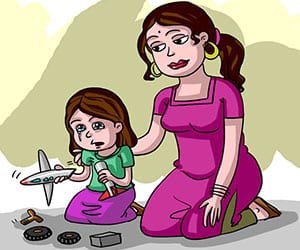

When it comes to parenting, we all want our kids to ‘obey’.
Let’s face it.
It makes our job easy…
And it’s simply more convenient to have our kids listen to us and ‘do as we say’.
RELATED: The Simple Guide To Increase Your Child’s Active Listening Skills >
But in the long run, is this good for your child?
Should children ‘blindly’ obey everything said to them?
At the same time, how do you deal with disobedience?
We did some research and what we’ve learned is, it all comes down to one thing — balance.
Too much or too little obedience is where the problem really arises!
But don’t worry.
We’ll tell you what you can do to establish this at home and some simple tricks to deal with disobedience in children.
When forced to obey blindly in every situation, children won’t understand what they’re doing, they won’t think for themselves and will grow into adults who can’t stand up for themselves.
An obedient child will follow instructions without understanding its repercussions and won’t take any responsibility for it.
That’s not what we want, right?
At the same time, disobedience shouldn’t be rewarded. There are situations where children must obey without being told twice — and especially during emergencies.
What we mean is, children should be empowered enough to understand when they must obey and when it’s okay to question the authority!
In this article, we’re going to tell you exactly how to make them understand this.
We have with us an expert in the field of Child Psychology, Vidya Ragu, who is going to run us through why children behave the way they do and how we can make our lives easier by getting them to listen to us.
Here’s what she says…
There have been several instances in which I’ve interacted with parents whose main concern is that their child doesn’t obey them.
An obedient child is a child that responds to every suggestion or command we give them in the same way we want them to respond in, right?
But get this…
Children are not robots.
They are people like you and me.
They’re trying to understand and make sense of our world in whatever way they can.
And one of the major behaviours that play a role in creating this understanding is disobedience.
Disobedience is absolutely normal!

Yes, you can breathe a sigh of relief!
So don’t be alarmed unless it’s to an extreme which makes it seem like mere rebelliousness.
Disobedience is a part of the developmental process of children in which they learn through trial and error.
Meaning, they experiment to see what is considered ‘acceptable’ and what is considered ‘unacceptable’ to adults.
“Will mom be upset if I scribble on the wall?”
“Can I cross the road without my parents looking?”
“Will dad be OK if I don’t eat my vegetables?”
If it is extreme and is constantly putting them in danger, it’s important to understand the child and find a customized way to help them — keeping in mind their environmental and family dynamics.
It’s important to make your child feel welcome to discuss what they can or cannot do, with you, at all times.
Children learn through imitation:
Children are observational learners.
They observe how adults around them respond to each other in different situations and try to imitate it.
An example of this would be — your child observing your interactions with your spouse during an argument and exhibiting a similar argumentative style when you request them to perform a task.
The same goes for the way interaction takes place with the house help, or basically any adult the child is around.
Apart from that, how we interact with the child is also just as important.
The child learns aggression when the parents deal with situations by hitting or screaming at the child.
Once they replicate the observed behaviour, they tend to judge whether or not it’s okay to do it, by the behaviour being rewarded or punished.
So it’s important to be mindful of this by establishing a pattern of communication.
A mischievous child is not a disobedient child:
If your child is playing in the sand or getting dirty or is even playing small (extremely harmless) pranks on people, then they just have a sense of mischief and isn’t the rebel you’re making them out to be!
RELATED: 12 Good Habits Every Parent Must Teach Their Child >
So what can you do to raise an independent thinking and well-behaved child?
Understand:
The first and foremost thing you need to do is understand why your child is exhibiting the disobedience that they are.
Supporting and understanding your child will make them feel less rebellious and will make them more compliant with your requests.
This is where perceptions come into play. The way your child sees the world is very different from the way you see it.
So, in order to find common middle ground, we need to build an access door to bridge the gap between these two vastly different perceptions.
This can only be done through communication.
 Communicate, don’t command!
Communicate, don’t command!
This, I think, is one of the most important things to keep in mind while trying to bring about obedience.
When you communicate your needs to your child calmly, especially if it’s done beforehand, you’re a lot more likely to get a successful change in their behaviour.
Reinforce the idea that politeness in children is important as you need to be polite in order to be treated politely by others.
Communication such as this also comes into play in the correction of behaviour.
Let’s say your child disobeyed you and engaged in negative behaviour of any sort.
Instead of screaming at them immediately, once you’re calmer and in private, you could talk to them about it and ask them why they did something that they knew would disappoint you.
Speak about alternatives and previously decided agreements as well.
Pick your moments:
Assess when your child is the best at listening. This is usually right after they play or after getting some good rest when they’re not heavily engaged in doing something.
Conversing about this during a meal is also a good idea. Choose these moments to bring about the topic of a specific instance of disobedience or indiscipline.
Suggest alternatives for what they could have done instead of disregarding your requests.
 Make them feel responsible:
Make them feel responsible:
If I could think of one major personality trait that differentiates children from adults, it would be claiming responsibility for ourselves and our actions.
How can we bring about this attitude in children from a young age?
Simple!
Just treat them in an equal and mature way which would make them feel responsible for their actions.
Make it sound like anything that they do by obeying you is teamwork that you’re splitting with them.
Ask them to help you by cleaning their room or making their bed.
Instead of shouting at your children for not doing their chores on time, sit them down and explain to them why this is a problem.
Talk to them about an equal share of work in the household’s functioning and about the importance of practising time management.
Again, remember to choose the right moment to talk to your child about something like this.
When necessary, be firm and concise:
In the situation that your child is in danger or there’s something that can simply involve no argument, instead of dawdling, just be firm in saying ‘no’.
When you’re screaming at them about various things in order for them to stop doing something or to agree with your point of view, children tend to get lost in the words and get aggravated.
It’s always better to be direct and firm in such situations.
If your child is older it’s always good to reason out with them. Explain why something isn’t good for them in a logical manner.
Follow the strict policy of no haggling:
When you’ve decided to strictly restrict your child from doing something and you are saying ‘no’ as firmly as you can, make sure that you don’t allow any room for negotiation or loopholes.
When you allow your child to haggle with you in such situations, they tend to understand that ‘no’ doesn’t really mean no.
It just means that they can still talk their way into convincing you.
 Use reinforcements often:
Use reinforcements often:
In order to make sure that the child knows that a certain type of positive behaviour they engaged in was appreciated and should be repeated, you need to remember to reward the behaviour.
A detailed verbal appreciation of what you liked about what they did can go a long way.
PRO TIP: You can also gift your child a fun box of educational activities! This way, your child will learn while having loads of fun. For more details on Flintobox activities, visit this link >
Conclusion:
All in all, you must realize by now that disobedience isn’t a serious issue unique to your child, it’s what every child goes through at some point or the other while growing up.
We’ve been there, too (although it’s almost impossible to imagine that now).
So, go easy on your child, and just try to understand them the best you possibly can because sometimes they’re just acting out to try and be understood or heard. Hear them out!



 Communicate, don’t command!
Communicate, don’t command! Make them feel responsible:
Make them feel responsible: Use reinforcements often:
Use reinforcements often:



Mel
Very informative article. Choosing the right moment to talk to the child bout their behaviour is very important. Thanks for the wonderful article.
Gayathri G
Thanks a lot, Mel 🙂
medha jha
vvery good article. thanks for sharing good thoughts
Gayathri G
Really glad you liked it, Medha 🙂 Thank you very much!
Maria
Very useful message.. thanks a lot
Gayathri G
Glad you found it useful, Maria!
G.madhu
Thank you, it helped a lot to understand a child.
Gayathri G
Thanks a lot, Madhu 🙂 Stay tuned for more articles from our end!
Kiran
Article make lot of sense. Loved reading it. Thanks
Gayathri G
Really glad you liked it, Kiran!
KEMMANNU BUSSTAND
Good thinking!! Never thought disobedience was normal for kids!
Gayathri G
Thank you very much 🙂
Satyendra kumar
I find very practical
Gayathri G
Glad you liked it, Satyendra 🙂
Harisree
Hi Madam
I respect your attitude. Its time to grow children not only physically but also mentally with education and good behaviour day by day.
The schools which are handling thousands of students also should focus on children psychology development.
Gayathri G
Thank you for sharing your views with us, Harisree 🙂
Nishanth
Informative.. We cannot force too much of obedience to a child. Let them do things the way they want and then as a parent, we need to tell which is good and wrong. Too much of obedience will spoil child’s playfullness for sure.
Gayathri G
Yes, that’s right! Thank you so much for sharing your views with us, Nishanth!
Prasanth Kumar Vinakota
Speaking to them about such things during a meal is a very bad idea. Most important point to be noted is, now a days children minds are getting corrupted mostly by media, TV shows, films, TV soaps, mobiles, tabs, etc., etc., They
are learning and imitating more from these things than parents. So the top most suggestion would be to keep them away from all those and let them grow in the lap of nature.
Gayathri G
Very true, Prasanth! Thank you for sharing your views with us 🙂